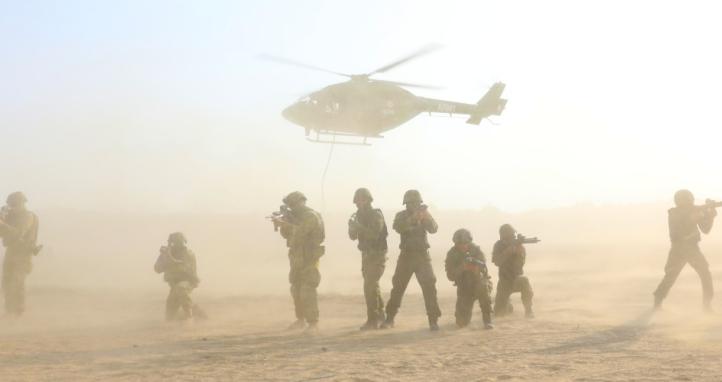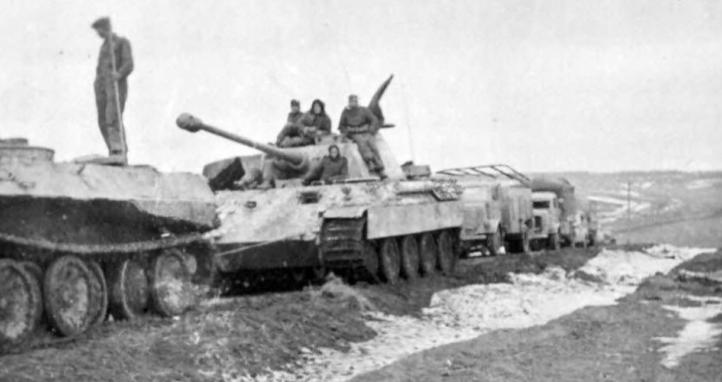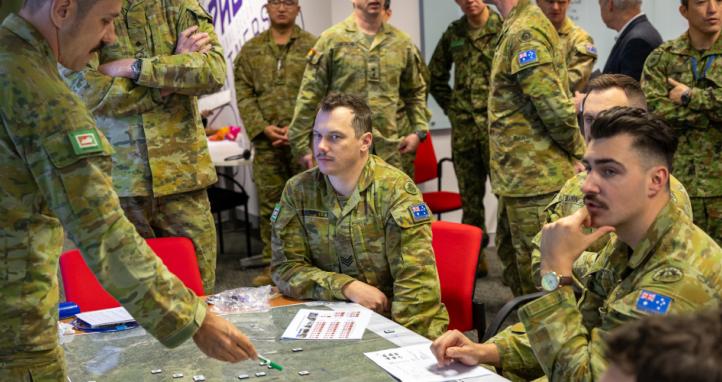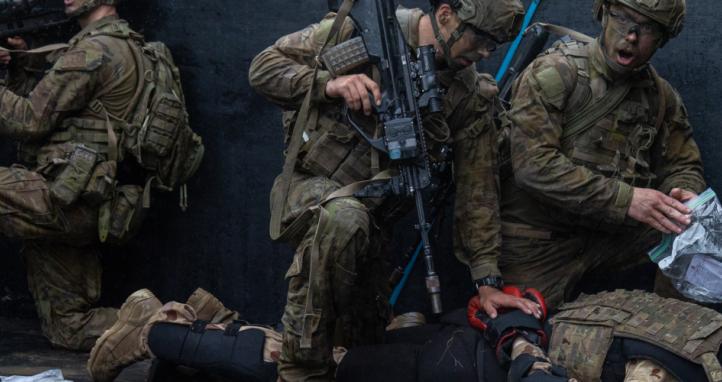Copies of 'British Generals in Blair's Wars' and 'High Command: British Military Leadership in Iraq and Afghanistan Wars' are available from the Defence Library Service.
Clausewitz wrote that ‘no other human activity is so continuously or universally bound up with chance [than war]… and with chance working everywhere, the commander continually finds that things are not as they expected’.[1] Admiral Nelson reflected that ‘something must be left to chance; nothing is sure in a sea fight beyond all others’.[2]
To counter the amorphous challenge of ‘chance’ in war, as described by Clausewitz, Nelson and others; humans develop logic. For military leaders, staff and operating forces, logic moderating the uncertainty, reciprocity and friction of chance in war is conceptualised, in part, via the operational level of war. This level of war is where campaigns and major operations are ‘planned, conducted and sustained to accomplish strategic objectives within theatres or areas of operations’.[3] The operational level of war ‘links the strategic and tactical levels… it is the use of tactical results to attain strategic objectives’.
The operational level includes deciding when, where, and under what conditions to engage the enemy in battle – and when, where, and under what conditions to refuse battle in support of higher aims. Actions at this level imply a broader dimension of time and space than actions at the tactical level. As strategy deals with winning wars and tactics with winning battles and engagements, the operational level of war is the art and science of winning campaigns. Its means are tactical results, and its ends are the established strategic objectives.[4]
The value of these two books is their critical examination, from differing perspectives, of British campaigns in Iraq and Afghanistan. British Generals in Blair’s Wars and High Command: British Military Leadership in the Iraq and Afghanistan Wars provide important, and not always complementary, insights into British operational thinking, planning and decision-making in the late 20th and early 21st Centuries. Both books, through the lens of the British experience, are a useful compendium for people aiming to understand the operational level of war.
British Generals in Blair’s Wars
British Generals in Blair’s Wars comprises 26 chapters, authored mainly by retired British generals, examining the campaigns of the British Army that followed the First Gulf War of 1991.[5] The campaigns include Northern Ireland, Kosovo, Sierra Leone, Iraq and Afghanistan. The book studies campaigning and generalship – framing operational means to achieve strategic ends – bringing to bear ‘the experiences of practitioners, direct from operations… informed by their decades of military experience and education’.[6]
In establishing the criteria for operational art, Lieutenant General Alistair Irwin asserts that ‘the purpose of a campaign plan is to set out how a strategic goal is to be achieved through military action’.[7] Irwin describes the process of designing and executing an operational framework as:
The politicians state what is in their mind, usually with plenty of restrictions and caveats; and the military then articulates the forces required and the sequences of operational actions or events that will lead to victory, or at least the satisfaction of the strategic goal. The tactical commanders then set about delivering the required success in each of these sequential events.[8]
In seeking operational success, General Sir Nicholas Parker asserts that the qualities required by an operational commander in the 21st century are pragmatism, persistence, a collective approach and clarity.[9] He emphasises that the ‘operational commander must be pragmatic, not weak, but there is a tendency to aim for 100 per cent solutions which will not work in a complex multinational, multi-agency environment’.[10] Parker expounds persistence as a combination of willpower to ‘force ideas through’, while listening to contrary views and having the ‘courage to change or adapt what you are doing in the light of experience’.[11]
According to Parker, an operational commander takes a collective approach and builds a ‘team that can cover [operational] complexity – much in the manner of a Board of Directors… [in delegating] responsibility for areas of the business to others so [the commander’s] energy and ideas can be used to best effect’.[12] Finally, Parker asserts that operational commanders strive for clarity, concluding that ‘no matter how complex the plan, it has to be put into effect, and success will often depend on people, far away from the decision-maker, understanding what is required and the context in which it has to be done’.[13] For these reasons, Parker argues that planning clarity and simplicity are virtues.[14]
General Sir John McColl argues that operations require command competencies in leading ‘joint and multinational, and more often than not, multi-agency [organisations]… Therefore, operational command is much more about diplomacy and gentle persuasion than giving orders’.[15] McColl asserts that an operational commander:
[N]eeds to be sensitive to the wider political context, when to bend and when to stick, but not to be shy about insisting upon a particular issue be it force composition, numbers, rules of engagement and equipment, because… [because] your perspective will have clarity and immediacy.[16]
Once an operation commences, General Sir David Richards contends that maintaining operational tempo is critical to campaign success, arguing that:
The key is devolving responsibility to talented, empowered people who understand the big picture, work to clear intent and are authorised, indeed required, to use their initiative and energy to ensure that what they are doing meets their narrow objectives and yet remains compatible with the clearly understood overall plan.[17]
Planning operations to achieve campaign effects is not simple, and the complexities of campaigning can challenge the most ardent military professionals. Lieutenant General Sir Graeme Lamb warns that:
Modern campaign management suffers from over-control [the first casualty of mission command], the simple lack of delegated authority, and the petty in-fighting that plagues the departments of state that make up a modern democracy.[18]
Countering General Lamb’s somewhat pessimistic view of campaigning, Major General Jonathan Shaw judges that generals leading operations require six characteristics:
- strategic understanding, creativity and judgment
- initiative to see what needs to be done and the courage to do it
- influence on the battlefield through education in human sympathies… [and] the ability to understand and indeed anticipate people’s motivations
- humility rather than arrogance
- attraction to ideas, not to the exclusion of, but certainly prior to action
- leadership to direct and understand what’s going on downwards and explain upwards[19]
Understanding operational and campaign challenges is a key requirement for military leaders, staff and operating forces. Authored by experienced British operational leaders, British Generals in Blair’s Wars is an important reference for military professionals as we think about, plan and execute current and future campaigns.

'British Generals in Blair's Wars' by Jonathan Bailey, 2013.
High Command
High Command: British Military Leadership in the Iraq and Afghanistan Wars examines ‘three distinct groups’ of British Ministry of Defence (MoD) leadership – ‘politicians, civil servants and military officers’[20] – who, from 2001, designed Britain’s operational support to the United States-led wars in Afghanistan and Iraq. In this book, Major General (Retired) Christopher Elliott explores issues of British military ‘institutional relationships’ and ‘internal rivalries… with responsibilities diffuse and authorities ambiguous’, and a MoD that ‘concentrated on making things work, rather than questioning whether what they were being asked to do was practicable’.[21]
High Command is written in three parts: What happened? Why it happened? What next?
Elliott’s fundamental question is: ‘why good people at the top of the [British] MoD could allow poor policies [on Middle East strategy, operations and campaigns], with bad outcomes, to occur’? Was it the ‘architecture of the MoD that caused the problems or was it that people failed [to simultaneously] master [day-to-day problems and the complexities of strategy in war]’?[22] Elliott’s aim is to ‘illustrate the traps and hazards that challenge military high command and how short-term judgements invariably contain [errors causing] longer-term [campaign] consequences’.[23]
Elliott asserts that, from 2000-2010, the UK ‘consistently failed to match its policy aspirations with sufficient military resources to deliver them’. He notes that, during this period, British grand strategy ‘was to support the USA whatever, since America had been underwriting security of the UK for at least half a century’.[24] As Prime Minister Tony Blair advised to the US Congress on 12 July 2002, ‘our job is to be there with you’, this meant that ‘if the US went to war, the UK would go to war’.[25] In effect, this ensured that ‘UK strategy was contingent on changes in US policy’, meaning that between 2000-2010 Britain declared variously their intent to:
…defeat al-Qaida, deny al-Qaida a sanctuary, to give the local populations security, to prevent terrorist attacks on the streets of British cities, to further democracy, to bring better governance, to defend the rights of women, and to stop drug production.[26]
Despite Britain’s grand strategy, as the ‘junior partner of US-led coalitions’, Elliott argues that in the Afghanistan and Iraq wars:
A common impression comes through from senior British military commanders that somewhere, outside and above them, the campaign strategy was incomplete and the policy wanting. Yet if you ask any politicians of the era, they would counter by saying that they consistently followed the military’s advice and gave them everything that they asked for. So, there is a disconnection here. Everyone agreed that things did not go well, but none of those involved seemed to believe that the fault lay with him or her.[27]
Emphasising this opacity of fault and accountability, High Command asserts that British military campaigns in both Afghanistan and Iraq lacked four key requirements:
- ‘sustained direction from top political leadership’, which included five Defence Ministers between 2000-2010
- consistent or clear strategic vision, operational foresight, judgements or guidance from the MoD combined with ‘a lack of understanding of the complexities of local situations’ in Iraq or Afghanistan’[28]
- a ‘whole-of-government approach’, including comprehensive ‘economic, judicial, educational and policing’ capabilities enabled to exploit operational success through taking advantage of security conditions created by the military[29]
- sufficient deployed armed forces capable of adapting and surging to defeat unexpected enemy actions, including through the accelerated deployment of reinforcements or mine resistant vehicles’[30]. Lack of available reinforcing troops meant the ‘UK became ‘fixed’ in both Basra and Helmand… and were devoid of resources to take the initiative’.[31]
Finally, Elliott notes that, between 2000-2010, the four British Chiefs of Defence Staff ‘emerged as very powerfully placed at the centre of prosecuting the wars of the decade’. High Command emphasises that all four leaders possessed ‘three essential characteristics’: imagination; experience; and, a questioning mind.[32] However, Elliott reveals the unsteady intellectual foundation upon which these three essential characteristics, required to design and lead campaigns, were built:
…none of [Britain’s] four Chiefs of the Defence Staff [between 2000-2010], nor any of their predecessors, bar one, had attended a university, for three years at university would have meant the loss of the same number of years of in-house military experience… [arguably, all four leaders] had escaped the formal intellectual training and broadening experience that university provides – particularly a grounding in conceptual skills – yet they were dealing with their [civilian] peers [in the MoD] almost all of whom had been to university (and the top ones at that).[33]
Elliott’s point is not that university education, per se, may have changed the outcomes of British campaigns in Iraq and Afghanistan. But that the British military system’s failure to ensure an appropriate education for its most senior leaders was an entirely unnecessary and avoidable risk to mission and risk to force.

High Command by Christopher Elliott, 2015.
Conclusion
As noted at the beginning of this review essay, to counter the amorphous challenge of ‘chance’ in war, humans develop logic, expressed by military leaders, staff and operating forces in the operational level of war.
These two books, British Generals in Blair’s Wars and High Command: British Military Leadership in the Iraq and Afghanistan Wars, narrate challenges the UK faced in prosecuting wars in Afghanistan and Iraq. For military professionals, comprehensive study and understanding of the operational level of war and campaigns are essential. These two books present an opportunity to learn from a military organisation that fought, learned and adapted during two significant 21st century conflicts.










RMC did start conferring degrees until 1971 with the UNSW affiliation beginning in 1967.
One problem with how we fought the Vietnam War, and more importantly how we absorbed its lessons (or not) into doctrine, policy and contingency planning throughout the 1970s and 1980s, was that most of those leading the army from company to the very top level in that era undertook their university degrees after the Vietnam War not before it. Particularly the non-technical degrees.
With Vietnam mainly a platoon and company-level war, and fought almost exclusively at the tactical level, this meant many of our leaders throughout the 1972-1990s period had not had the advantage of university study (and an intellectual as well as professional framework to build on) before the major formative experience of their professional lives.
This had a profound detrimental effect on Army's operational and strategic-level interfaces with the Defence bureaucracy, the parliament and ministry, and the Australian people at large. We often did not argue our case well, nor always understand why it went badly when we lost.
It also tended to stunt much of our doctrine and force structure development, particularly given the post-Vietnam anti-military atmosphere and ideological polarisation of the era.